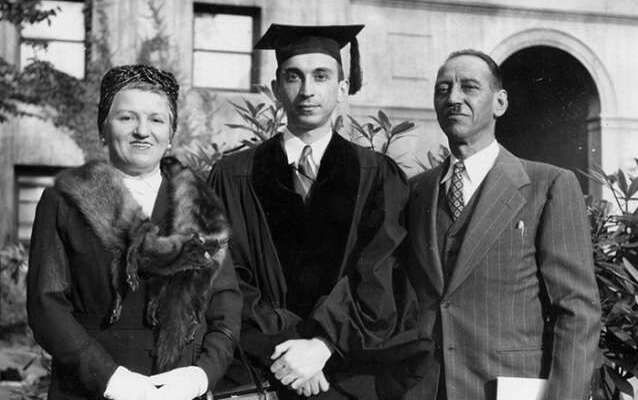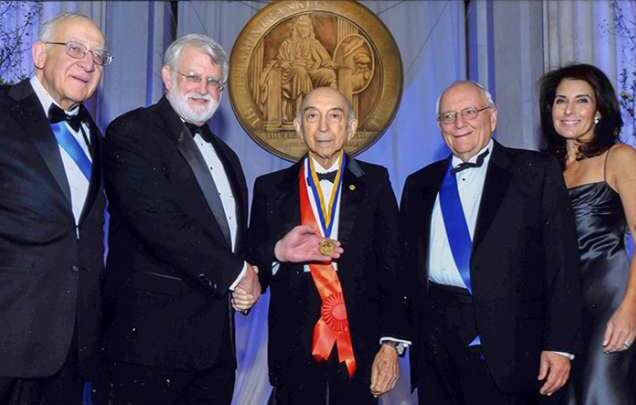A prominent Azerbaijani scientist, author of the theory of fuzzy logic Lotfi Zadeh
Lotfi Zadeh was born on February 4, 1921 in Baku, Azerbaijan, as Lotfi Aliaskerzadeh. In 1931, when Zadeh was ten years old, his family moved to Tehran in Iran, his father’s homeland. In 1942 he graduated from the Electrical Engineering Tehran University in Iran. In 1943, Zadeh decided to immigrate to the United States. He arrived in mid-1944 and enrolled at the Massachusetts Institute of Technology (MIT) and in the same year in graduate school. While in the United States, he changed his name to Lotfi Asker Zadeh. He received an MS (Master of Science) degree in electrical engineering from MIT (Massachusetts Institute of Technology) in 1946, and then applied to Columbia University. He received his Ph.D. (Doctor of Philosophy) in electrical engineering from Columbia in 1949, and became an assistant professor the next year. Zadeh taught for ten years at Columbia, was promoted to Full Professor in 1957. Since 1959 he worked as a Professor at the Berkley University and since 1963 he headed a Chair of Electrical Engineering and Computer Science at this University. Professor Lotfi Zadeh had a professorship at the University of California, Berkeley, until the end of his life and was the director of the Institute for Soft Computing.
engineering from MIT (Massachusetts Institute of Technology) in 1946, and then applied to Columbia University. He received his Ph.D. (Doctor of Philosophy) in electrical engineering from Columbia in 1949, and became an assistant professor the next year. Zadeh taught for ten years at Columbia, was promoted to Full Professor in 1957. Since 1959 he worked as a Professor at the Berkley University and since 1963 he headed a Chair of Electrical Engineering and Computer Science at this University. Professor Lotfi Zadeh had a professorship at the University of California, Berkeley, until the end of his life and was the director of the Institute for Soft Computing.
L. Zadeh has developed 5 fundamental scientific theories. He founded the Zadeh Institute for Information Technology - ZIFIT in Berkley, USA. One of the theories of L. Zadeh known in science as z-transforms laid foundation for the creation of discrete and digital control, information and communications systems. The famous State Space, theories of control and tracking of dynamic systems developed by Zadeh constitute the basis of the modern science of control. Based on these theories NASA designs, develops and implements various purpose control systems. The most popular theory of Zadeh is the Fuzzy Logic Theory. This theory has extended the theory of binary sets that forms the foundation of mathematics through introduction of the concept of Fuzzy Sets. In science the introduction of fuzzy dimension has created an opportunity for more adequate reflection of uncertainty present in processes developing in nature and society. Soft Computing theory of Zadeh constitutes the basis of new technologies through intellectual combination of methods of fuzzy logic,  artificial neuron networks, genetic algorithms, theory of khaos and probabilistic inference paradigms. In computers working on the basis of “Verbally operated computers” theory of Zadeh the words and phrases are used for granulation of information. Computers of this type are capable of making approximate logical inference and are the most adequate models of human brain, which process the information on the basis of representations. The Theory of Representations of Zadeh offers methods that allow quick obtaining of complete information about surrounding world without performing of accurate measurements. The purpose of this theory is to develop principles and methods for the creation of artificial knowledge representation systems similar to those of human being. L. Zadeh is considered to be the most referenced scientific author in the world. Just in 1990-2000 there were more than 36000 references made with regard of his articles and monographs. He has received a big number of the awards and medals from various honour societies. He was an Honoured Doctor of the many foreign state and public organizations. Lotfi Zadeh has been elected as an Honoured Member of the National Academy of Sciences of the Republic of Azerbaijan.
artificial neuron networks, genetic algorithms, theory of khaos and probabilistic inference paradigms. In computers working on the basis of “Verbally operated computers” theory of Zadeh the words and phrases are used for granulation of information. Computers of this type are capable of making approximate logical inference and are the most adequate models of human brain, which process the information on the basis of representations. The Theory of Representations of Zadeh offers methods that allow quick obtaining of complete information about surrounding world without performing of accurate measurements. The purpose of this theory is to develop principles and methods for the creation of artificial knowledge representation systems similar to those of human being. L. Zadeh is considered to be the most referenced scientific author in the world. Just in 1990-2000 there were more than 36000 references made with regard of his articles and monographs. He has received a big number of the awards and medals from various honour societies. He was an Honoured Doctor of the many foreign state and public organizations. Lotfi Zadeh has been elected as an Honoured Member of the National Academy of Sciences of the Republic of Azerbaijan.
Lotfi Zadeh died on September 6, 2017 and was buried in Baku on the Alley of Honor.
Recommended literature:
- Zadə, Fey. Qeyri-səlis məntiqin atası ilə həyatım və səyahətlərim / F. Zadə ; rus dilindən tərc. Ü. Hüseynova ; red. M. Axundova ; Qafqazın Strateji Tədqiqatlar İnstitutu. - Bakı : Qafqaz NE, 2006. - 368,[23] s.
- Əliyev, Möhbəddin Səməd oğlu. Dünya dahilərsiz yaşaya bilmir / M. S. Əliyev ; elmi red. M. Mərdanov ; red. Ş. Vəliyev ; Qafqazın Strateji Tədqiqatlar İnstitutu. - II nəşri. - Stockholm : CA&CC Press, 2008. - 190,[8] s.
- Алиев, Мохбаддин Самед. Мир не может существовать без гениев / М. С. Алиев ; пер. с азерб. Р. Бабаева ; науч. ред. М. Дж. Марданов ; отв. за вып. М. Садыхов ; рец. Р. Алиев ; Институт Стратегических Исследований Кавказа. - Стокгольм : CA&CC Press, 2011. - 156 с.